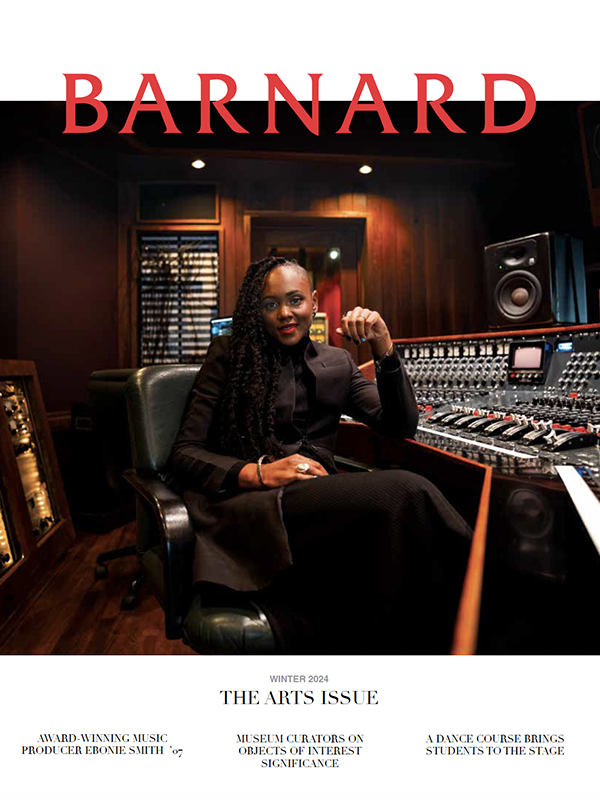During his long career as a historian with an emphasis on the Colonial and Revolutionary periods and on Constitutional law, Herbert Sloan hasn’t meandered far from his dissertation topic: the financial trials of Thomas Jefferson. In the process, Sloan, a Barnard faculty member since 1986, has become a well-known expert on the subject; his research shows that Jefferson was not a reckless spender but was bankrupted largely because of his role as executor of his father-in-law’s estate. The focus has served him well. “Because it deals with a famous person, the topic stays alive,” he says.
Retiring from the College this spring, but returning as a senior scholar for the next academic year, Sloan has strong feelings about the academic world, one he knows intimately. He not only grew up in the college town of Ann Arbor, Mich., among children of other scholars, but he also hails from a family steeped in university life—with his father, grandfather, uncle, and two great-uncles, all professors of various disciplines. As early as high school, Sloan says, “I used to tell everyone what was what” in the realm of history. An avid reader of Bruce Catton’s Civil War narratives, Sloan knew the day he entered Stanford University what major he would pursue. He didn’t immediately gravitate toward early-American history but studied much European history; he says, “I specialized in taking classes with people who were interesting.”
Three years later, he pursued the same strategy in a graduate program at Columbia University, and was strongly influenced by two professors of early-American history, Peter Onuf and the late Eric McKitrick. The subject matter recalled Sloan’s childhood visits each summer to his grandmother’s home in Marietta, Ohio, a pioneer town with a history museum that fascinated him. Even more than the topic, the dynamic lectures of McKitrick also awed Sloan. These “performances,” as Sloan calls them, were marked by irony, ambiguity, and paradox. They were modeled after those delivered during what Sloan describes as the golden age of Columbia, which he says spans the post–World War II period to l968, and includes such illustrious professors as Lionel Trilling, Richard Hofstadter, C. Wright Mills, and Meyer Schapiro.
During his time at Barnard, Sloan has appeared on several popular media outlets as “the historical expert.” He allows, “That’s just the way it is when you’re in the Columbia universe.” But one senses that his wry humor and affable manner may also have played a role. In 2001, he appeared briefly on The Daily Show with Jon Stewart to refute the credentials of a pundit who claimed that George Washington was not the nation’s first president. In 2012, WNYC radio asked Sloan to vet the historical accuracy of a “Revolutionary pop playlist,” a group of songs that referenced at least one of the Founding Fathers—one example was “Lincoln, Washington, and that Jefferson Guy” by They Might Be Giants. The History Channel beckoned in 2013 for its program 10 Things You Don’t Know About. Sloan discussed financial difficulties experienced by some early U.S. presidents.
Sloan’s achievements include the publication of numerous essays and the book, Principle & Interest: Thomas Jefferson and the Problem of Debt, first printed in 1995 by Oxford University Press. He also received Barnard’s Ann Whitney Olin professorship for excellence in scholarship and teaching. Another highlight was receiving the Emily Gregory Award. “It was a validation that I was not in deep trouble,” says Sloan with a smile. Students nominate the recipient of the Emily Gregory, which pays tribute to a professor’s teaching and service. Not surprisingly, the admiration is mutual. “They’re smart and they’ve gotten smarter,” says Sloan. As for this generation’s ready access to information? “It’s not entirely a positive development,” says Sloan, who has also taught at Hunter College and Columbia. He adds that researchers today inevitably lose a deeper sense of learning because they don’t need to sift through pages of material. On the other hand, Sloan is not unilaterally opposed to change.
He does advise widening the scope of teaching early-American history to include the entire hemisphere. With the demographic changes in the U.S., Sloan says it no longer makes sense to tell the story of America as “starting on the East Coast and then marching...until you get to the San Francisco Bay. We need to give much more thought to what happens in the Spanish colonies.”
Sloan adds, “There’s also that great non-subject, Canada, our largest trading partner. Americans know nothing about Canada, and that is amazing.” It just may be up to Sloan to institute some of these modifications. He’s retiring, except that as a senior scholar, he’ll be teaching two classes, including a survey course on U.S. history. “The chair twisted my arm,” he says.
